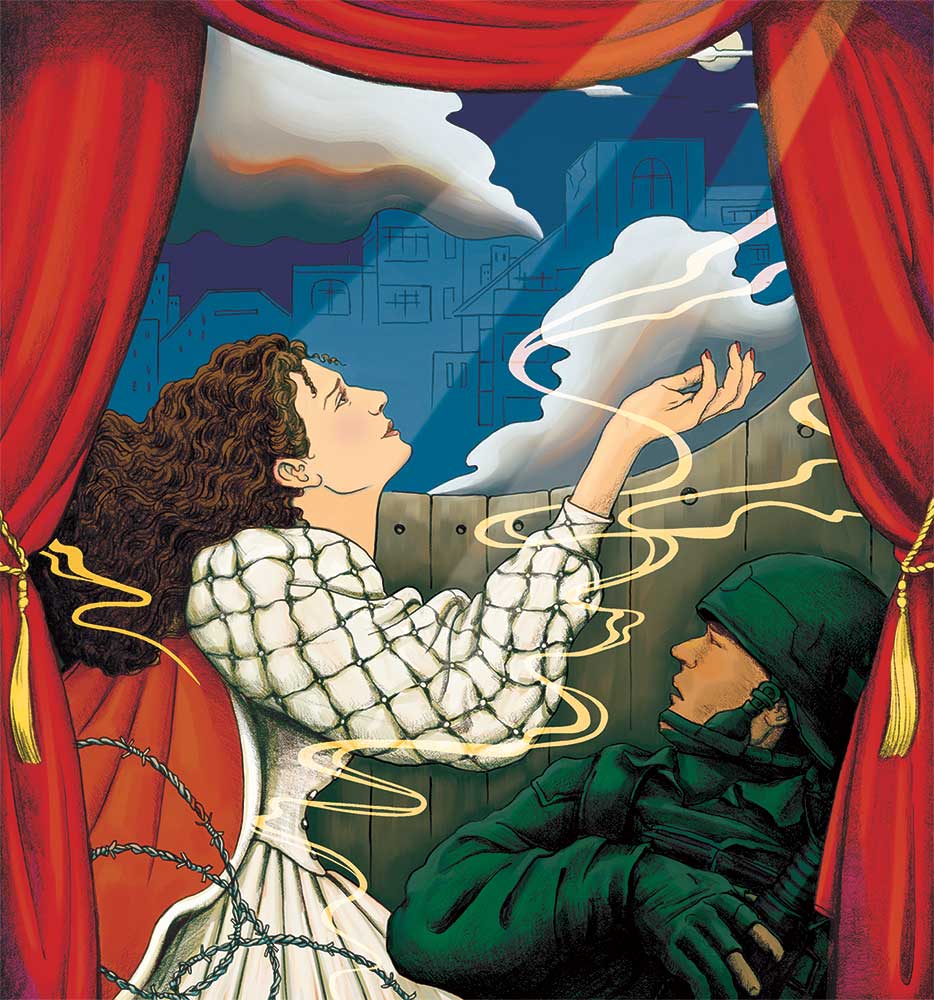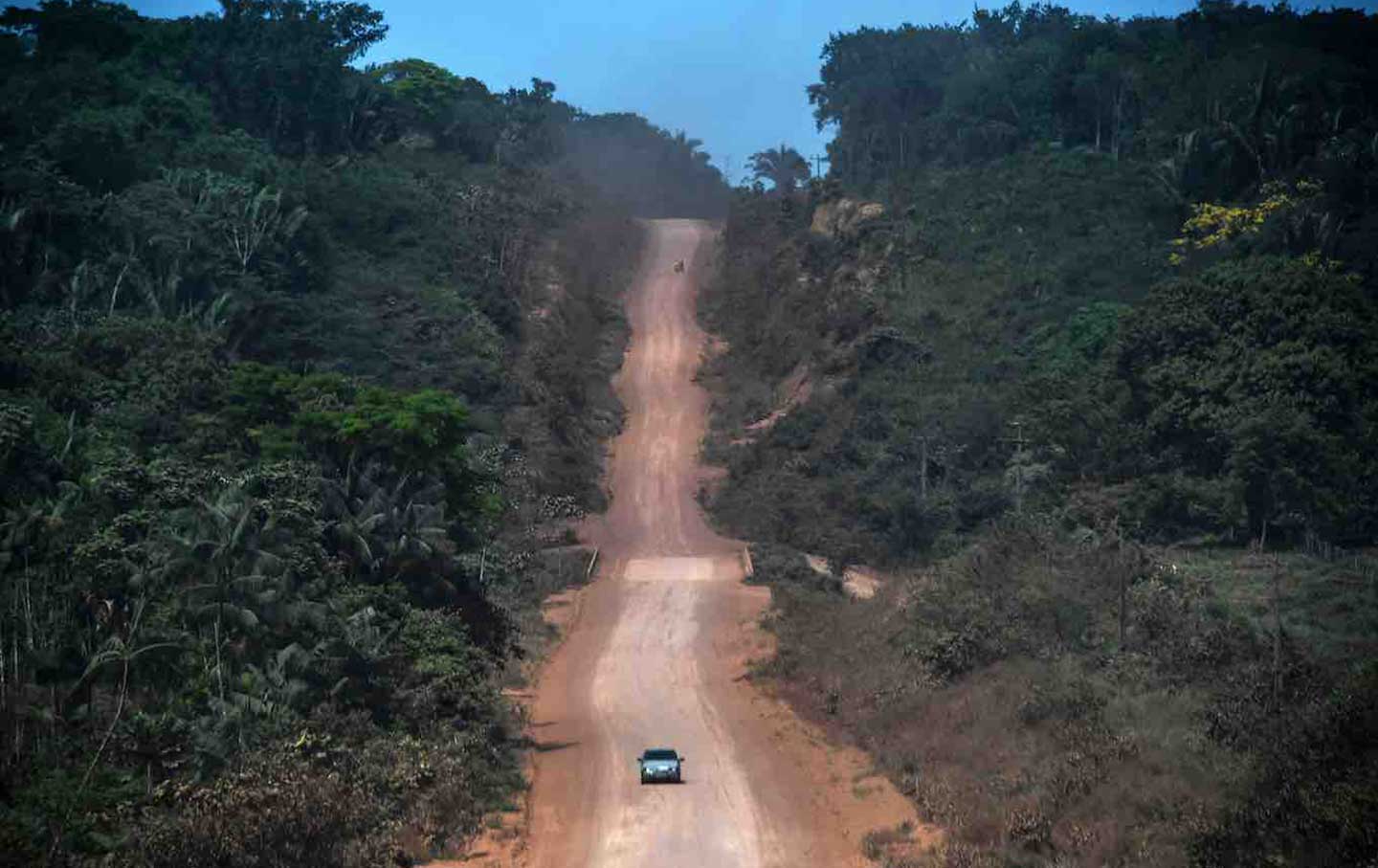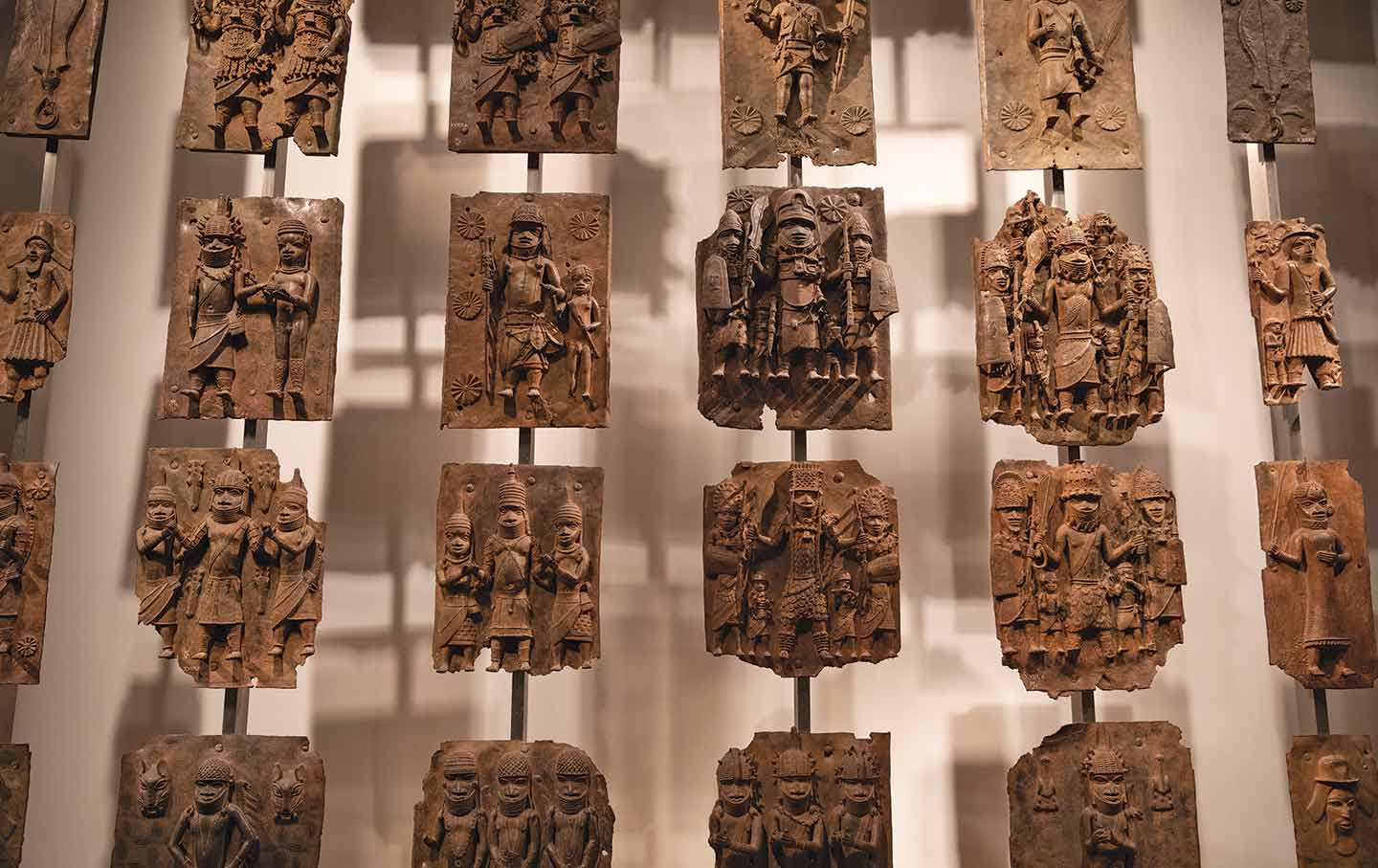In the Midst of Disaster
Isabella Hammad’s novel of art and exile in Palestine.
Isabella Hammad’s Novel of Art and Exile in Palestine
Enter the Ghost looks at a group of Palestinians who try to put on a production of Hamlet in the occupied West Bank.

What are the differences between Palestinians living in the West Bank and Palestinians living in Israel? Right now the differences between those in Gaza and those in much of the rest of the world are glaring. With the threat of a second Nakba looming, civilians in Gaza are under the constant threat of death as the Israeli bombardment continues to add to the more than 20,000 already killed there. But when it comes to Palestinians in the West Bank, where I live, and those in Israel, in many ways our experiences are similar. As with Palestinians who live in the West Bank, for those who remained within the boundaries of the Israeli state, life has continued to be every bit as complex, grueling, and punishing as it was in the early days. Israel continues to deny what happened to Palestinians in the Nakba, and indeed, many in Israel fear telling their children the truth about those events. Like Palestinians in the West Bank, many in Israel also have experienced life under military rule, which was in place until 1966, and to this day are treated as second-class citizens. Like Palestinians in the West Bank, they are subjected to expropriations of their land and restrictive land-use schemes that have allowed maximum room for Israelis to expand and that leave Palestinians confined to smaller and smaller areas.
Books in review
Enter Ghost
Buy this bookYet there are differences, too. Whereas the Palestinians in Israel are expected to celebrate Israel’s independence day, those of us in the West Bank have not had to endure such humiliation. Meanwhile what Palestinians from “the inside” experienced in the 1950s and ’60s is what we have been experiencing in the West Bank since 1967. As with them, our lands are being taken, and we are forced to live close to Israeli communities who are now using the land of which we have been deprived. Likewise, while Palestinians in Israel have been spared the daily harassment from the army since 1966, such treatment continues to be commonplace in the occupied West Bank. But since they are often cut off from each other, I have sometimes wondered whether the Palestinians in Israel have long felt the same way as the Palestinians in the West Bank? Is the anger and sense of dispossession any different from what we feel in the West Bank? I once asked a Palestinian citizen of Israel to enlighten me. He was not very forthcoming, and it made me realize how sensitive those on “the inside” were to the question of who had lost the most. It also made me realize that there was another sensitivity at play: Who had ended up more fortunate? No one wants to feel like they lost more.
In Isabella Hammad’s new novel, Enter Ghost, I found echoes of these difficult questions. In the novel, Palestinians from both sides of the border come together to stage a production of Hamlet in the West Bank. The protagonists find themselves united in many ways: They are often stirred up by the humiliations imposed on them by Israeli soldiers. They are worried about the same arbitrary acts of dispossession, and they all have to negotiate a complex emotional terrain with friends and family on both sides of the border. As I approached Hammad’s novel, I was also curious to see whether the parts that take place in Ramallah, where I live, rang true. And on all these accounts, I was not disappointed. Hammad is not only a talented novelist; she is also a rigorous researcher, and she paints an authentic picture of Palestinian life, whether it takes place inside Israel or in the West Bank.
Hammad has always been an ambitious writer. Her debut novel, The Parisian, published in 2019, offered a superb mix of the personal and the political. Set in the first half of the 20th century, The Parisian tells a sweeping story of Palestinians caught up in the turmoil of events in both Palestine and France. Likewise, in Enter Ghost, Hammad navigates between the personal and the political in what has come to be her signally seamless manner. She moves across these borders often, almost as if they did not exist.
Enter Ghost begins with a type of incident that many Palestinians are familiar with: the treatment they are subjected to as they enter the country through Ben Gurion Airport.
We are told that Sonia, the novel’s 38-year-old protagonist, has been away from Palestine for many years and has now come to see her sister in Haifa. Her sister’s friend Mariam is directing a production of Hamlet in Arabic that will take place in Ramallah. Sonia is asked to play Gertrude, which she at first declines. She is reluctant to perform in Arabic, a language she has not spoken regularly for quite some time, but she finally agrees to take the role.
The other actors in the play are from various parts of the West Bank and Israel. This ensures that there are plenty of interactions in the novel between Palestinians living in the two areas and also a lot of border crossings between Haifa, in Israel, and Ramallah, in the West Bank. In one such crossing, an incident takes place that rang so true to me I kept thinking about it afterward. The troupe leaves Ramallah for Haifa: In the car are two Palestinian citizens of Israel; one West Bank resident, Wael, with a temporary permit; and Sonia, a foreign national of Palestinian descent with an Arabic name. As they are leaving, they see a news alert on the phone that two Israeli guards have been killed outside Al-Aqsa Mosque in Jerusalem and that the Israelis are closing the surrounding area of al-Haram al-Sharif in response.
As the troupe listens to this bulletin, they are stopped at the checkpoint that marks the border with Israel. Wael, the only West Bank resident, is ordered out of the car by a soldier and taken to a nearby building. As they pass through the doorway, the soldier taps Wael on the back of the head, which causes him to flinch into an automatic hunch. This infuriates Sonia, who gets out of the car and walks toward them, determined to “save” Wael, while Mariam and Ibrahim—the two Palestinians from inside Israel—shout at her to come back. But Sonia doesn’t. Instead, using a ploy that Palestinian women adopted during the First Intifada of claiming that every young man the Israelis tried to arrest was their offspring, she asks the soldier: “Where have you taken my son?” (A somewhat preposterous claim given their ages.)
When the soldier orders Sonia to go back to the car, she recognizes his English accent and asks whether he’s from Manchester. She follows this by asking what he’s doing in Palestine. He answers her: “I’m not from Manchester, I’m from Leeds! And I’m here defending my people.” He then orders her again to return to the car. Once she does, Sonia apologizes to her friends, and Ibrahim says angrily, “What the fuck was that?”
The incident ends after Wael is released an hour later. For the rest of the way, they all sit in silence. “I tried not to think about Ibrahim,” Sonia muses, “and instead compared, in a detached way, my personal terror at being punished as a foreign national with Wael’s very real position of risk.”
The first indication that Sonia has something in her past that she is hiding comes when Wael asks her whether she has a Nakba story in her family. At first, Sonia says she doesn’t, perhaps because she’s too proud to admit it. But it turns out that she is living with her uncle’s shame. He has done the unpardonable in the eyes of Palestinians: Many years after the Nakba, he sold the family home in Haifa to an Israeli and subsequently moved to the West Bank.
At one point, Sonia and her friends go to visit the house, which leads to an unexpected encounter with the Israeli Jew who now inhabits it. Interestingly, the first one to propose they leave once the owner appears is Mariam, the Palestinian living in Haifa. She tells him, “Okay, we’re leaving,” to which he replies, “Take your friends. This is not a bar.” Sonia responds, “I know it’s not. It’s my house…. This is my family’s house. My dad grew up here.” Then she adds, “I just felt nostalgic. That’s all.” In a typically brusque and insensitive Israeli manner, the man responds, “Well, that’s very nice. But you can keep your nostalgia quiet. Thank you.”
As they walk back to the car, something enormous can be heard rustling in the bushes, and Sonia says, “Haifa really has a problem with wild boar.” Her friend Salim agrees: “Yes. It’s chronic.”
Many of the early interactions between Sonia and her new friends serve as a echoes of the play they intend to perform. As in Shakespeare’s tragedy, where Hamlet plans to expose the guilty conscience of his uncle with a play within the play, Sonia and her friends hope to confront the guilty conscience of Israelis for the crimes their country has committed against the Palestinians.
As Hammad explained in a conversation with the Scottish magazine The Skinny, “I wanted the putting on of a play to be an opportunity, a cipher for other kinds of organising as well. One of the elements of the architecture of the Israeli regime is to fragment—and to solidify the fragmentation of—the Palestinian body politic.” Hammad seeks to address this fragmentation by giving her readers “a look at the social drama of these different people who have these different political and social experiences and legal statuses, and yet are unified by it.”
Popular
“swipe left below to view more authors”Swipe →As the plot of Enter Ghost progresses, it becomes clear that Sonia is seeking not only to confront Israelis about their past crimes but also to confront her own past. She reexamines her understanding of her family members’ involvement in the Palestinian resistance. One of her most powerful memories is when, as a teenager, she visited a released Palestinian prisoner who had been on a hunger strike. Sonia’s difficult relationship with her sister in Haifa, as well as the breakdown of her marriage in London, are also woven in thoughtfully throughout the story.
As in Shakespeare’s play, the struggle in Palestine/Israel is also represented as fraternal. There is the struggle for justice, as in the murder of King Hamlet and the constant attempt on the part of Palestinians to awaken the conscience of Israelis to what is being done to an entire people in their name. But the novel is not just about the political aspects of life; it also delves into the stories of the various characters and the experiences of its protagonist. Sonia’s difficulties with lovers, pregnancies, and misogyny are all part of the novel’s wider canvas.
At every point, as Hammad details the exhausting day-to-day struggles that Palestinians have to endure, she finds humanity and complexity in their responses. Contrary to what one might expect, the bloody events taking place in the West Bank do not prevent the theater troupe from going ahead with their performance of Hamlet. In the oft-heard justification by Palestinians trying to keep cultural activities alive despite the turmoil taking place all around them, Mariam says, “If we let disaster stand in our way we will never do anything. Every day here is a disaster.” Such a statement could be made about Hammad’s novel, too: She has found a way to tell a story that is artful, and humane, in the midst of disaster.
As we get closer to the day of the performance, some questions still loom over Sonia and her friends: Will the Israeli soldiers allow the play to be performed in the West Bank? And will their production of Hamlet succeed, as The Murder of Gonzago does in Shakespeare’s play, in its attempt to “catch the conscience” of their Israeli tormentors? In the end, the troupe is successful in defying the Israeli soldiers and staging the play at the checkpoint. “Exactly whose idea it was, I already can’t recall,” Sonia says. “Only, since it was suggested, everyone has egged each other on, which means that any individual fits of doubt have been staggered, and there’s always an adequate level of confidence at any one point to carry us forward.” They also decide to dress as Israeli soldiers, but the audience is not confused. Hammad writes: “There’s an initial jolt, some intakes of breath, but then the dialogue starts and everyone recognises that the uniforms are costumes. The effect is interesting, actors-as-soldiers on-stage-beside-checkpoint.” During the performance, the Israeli soldiers stop to watch at the moment when Hamlet plans the play that, it is hoped, will force the murderous Claudius to confront his guilt. But will the soldiers watching the play get the message? Perhaps that is too much to expect, even in the realm of fiction.
More from The Nation

The Agony of Aaron Rodgers The Agony of Aaron Rodgers
Is he the world’s most interesting athlete or is he just a washed-up crackpot?

Can You Understand Ireland Through One Family’s Terrible Secret? Can You Understand Ireland Through One Family’s Terrible Secret?
In Missing Persons, Clair Wills's intimate story of institutionalized Irish women and children, shows how a family's history and a nation’s history run in parallel.

Peter Schjeldahl’s Pleasure Principle Peter Schjeldahl’s Pleasure Principle
His art criticism fixated on the narcissism of the entire enterprise. But over six decades, his work proved that a critic could be an artist too.

How the Western Literary Canon Made the World Worse How the Western Literary Canon Made the World Worse
A talk with Dionne Brand about her recent book, Salvage, which looks at how the classic texts of Anglo-American fiction helped abet the crimes of capitalism, colonialism, and more...

Along the Roads That Built Modern Brazil Along the Roads That Built Modern Brazil
José Henrique Bortoluci's What Is Mine tells the story of his country’s laborers, like his father, who built its infrastructure, and in turn its fractious politics.

The Long History of the "Elsewhere Museum" The Long History of the "Elsewhere Museum"
Can the ethnographic museum be reinvented?


